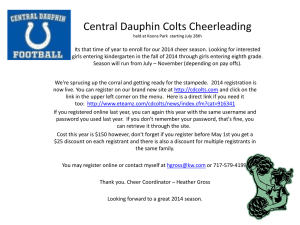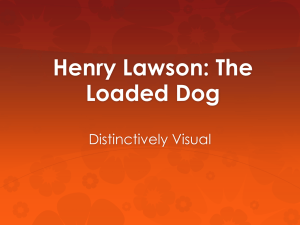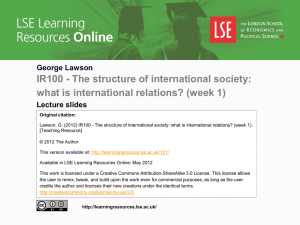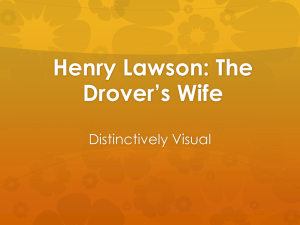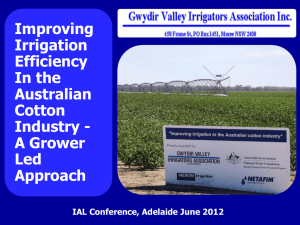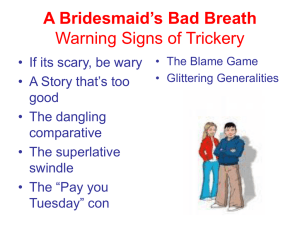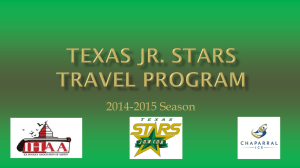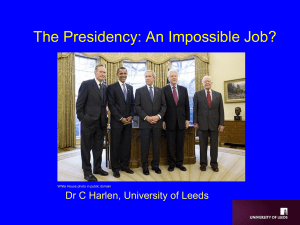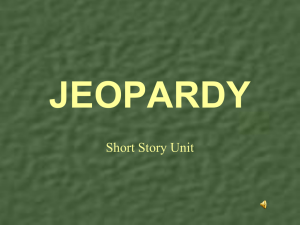Lawson-In a Dry Season-Michelle Merritt
advertisement
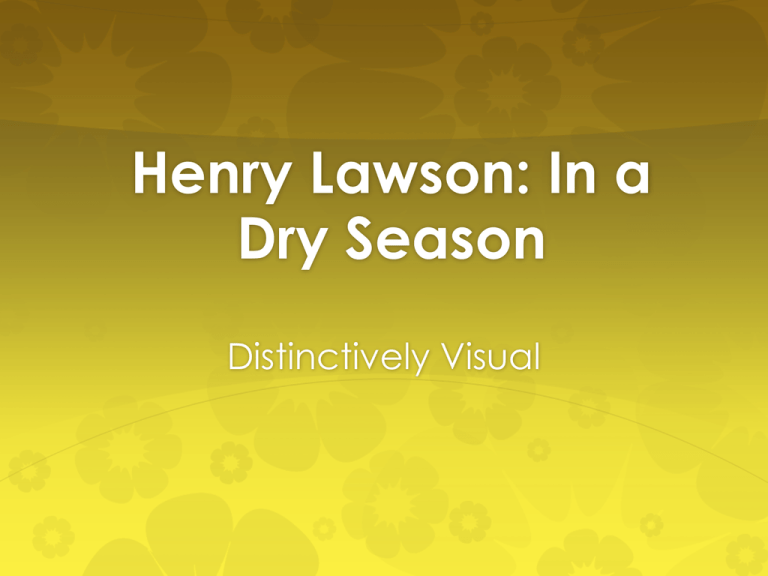
Henry Lawson: In a Dry Season Distinctively Visual Distinctively Visual As part of this study you will be asked to explore the ways the images we see and/or visualise in texts are created. You will consider how literary form and structure and the language used in different texts create these images, affect interpretation and shape meaning. Distinctively Visual The scenes created by Lawson allow the reader to appreciate a place they have never seen. He draws on personal experience to depict a bush lifestyle that is fast disappearing. Distinctively Visual: elements conveyed through … Context Audience Form Imagery Symbolism language In a Dry Season The narrator of this story is on a train to Bourke and describes the people and places he sees along the way. The reader comes to develop a mental picture of the landscape both inside and outside the carriage as the narrator describes the sights outside and tells us about the people and the stories they tell inside the train. In a Dry Season Some say that the narrator of the story in Lawson himself and that these experiences come from his only trip ‘outback’. In a Dry Season Lawson conveys a feeling of monotony as the reader comes to understand that these towns are all very similar. A sense of desolation and despair about life in the bush is developed. "Draw a wire fence … Then you'll have the bush all along the New South Wales western line from Bathurst on” … "The only town I saw that differed” …"By way of variety, the artist might make…" In a Dry Season Lawson describes the bush setting in a highly visual way. It is a harsh, inhospitable environment where nothing comes easy; people are always 'trying' to do things. "the Macquarie--a narrow, muddy gutter with a dog swimming across” … "Somebody told me that the country was very dry on the other side of Nevertire. It is. I wouldn't like to sit down on it any where" In a Dry Season Setting • “The railway towns consist of a public house and a general store, with a square tank and a school-house on piles in the nearer distance. The tank stands at the end of the school and is not many times smaller than the building itself. It is safe to call the pub "The Railway Hotel," and the store "The Railway Stores," with an "s…There is sometimes a small, oblong weather-board building--unpainted, and generally leaning in one of the eight possible directions, and perhaps with a twist in another--which, from its halfobliterated sign, seems to have started as a rival to the Railway Stores; but the shutters are up and the place empty.” In a Dry Season Narration •First person, homodiegetic narration. A travelogue depicting a short outback train trip to Bourke. The narrator serves as our tour guide outlining what we see along the way. In a Dry Season The characters here are all sketches, stereotypes or generalisations - they represent groups of people. They are described through the clothes that they wear, "Slop sac suits, red faces, and old-fashioned, flat-brimmed hats, with wire round the brims” …”tail-coat turned yellow, a print shirt, and a pair of moleskin trousers” In a Dry Season Sundowners: • A 'sundowner' is the name Lawson gives to the group of people that would turn up at sundown, when the bulk of the work is over with a promise of working the next day in exchange for room and board for the night. "He carried a Royal Alfred, and had a billy in one hand and a stick in the other” "dressed in a tail-coat turned yellow, a print shirt, and a pair of moleskin trousers, with big square calico patches on the knees” "killing a snake ...perhaps he only thought of Adam" In a Dry Season The Shearers: • Shearers were tough, they had to lift and manage the sheep, whilst using blades to remove the wool. Lawson mentions that the shearers are respected and admired by the community for their independence. "They dress like the unemployed, but differ from that body in their looks of independence” This group of people wouldn’t have cared much for their appearance and were paid well for their back-breaking work. In a Dry Season The Unemployed: • They start off happy and eager to get to their new place of employment. Lawson tells us that they soon realise that things aren't as easy as they thought and their cheerfulness is quickly dispelled when they reach the train station and learn that they are not yet at their destination. The life of the unemployed is of destitution. "He has an idea that the station where he has the job will be within easy walking distance of Bourke. Perhaps he thinks there'll be a cart or a buggy waiting for him. He travels for a night and day without a bite to eat, and, on arrival, he finds that the station is eighty or a hundred miles away.” In a Dry Season The Bush Liar: • He entertains the carriage with his stories of the bush and his boxing prowess; however, we soon get the feeling they are all false and dramatised for effect. "bush larrikin”… "He was a bit of a scrapper”… "talked a lot about the ring" Literary Techniques Imagery •animal imagery •monotony and sameness of the scenery •description of the people Literary Techniques Language • Literal language refers to words that do not deviate from their defined meaning. • Figurative language refers to words, and groups of words, that exaggerate or alter the usual meanings of the component words. • vernacular: "Yer wanter go out back, young man, if yer wanter see the country. Yer wanter get away from the line." I don't wanter; I've been there." • colloquial and colourful language: "he was a bit of a scraper" and "dressed in all his glory" Literary Techniques Sarcasm: • "Native Industry was represented at one place along the line by three tiles, a chimney pot, and a length of piping on a slab" and the narrator implies that these conditions are common. Irony: • The persona describes the setting and the people in a way that allows us to view them this in term makes us wonder what else is there and make conclusions about the environment as being uninspiring. Literary Techniques Understatement: • In a dry season the Macquarie River is described as "a narrow muddy gutter" Dark Humour • "Yer wanter go out back, young man, if yer wanter see the country." I don't wanter; I've been there.” …”"The least horrible spot in the bush, in a dry season, is where the bush isn't”… "Death is about the only cheerful thing in the bush” … "They talk of settling people on the land! Better settle _in_ it" Literary Techniques Euphemism: • "through to the bitter end" Authorial Intrusion: • Lawson makes comment of the social system “God bless the publican and the coach-driver! God forgive our social system!”
